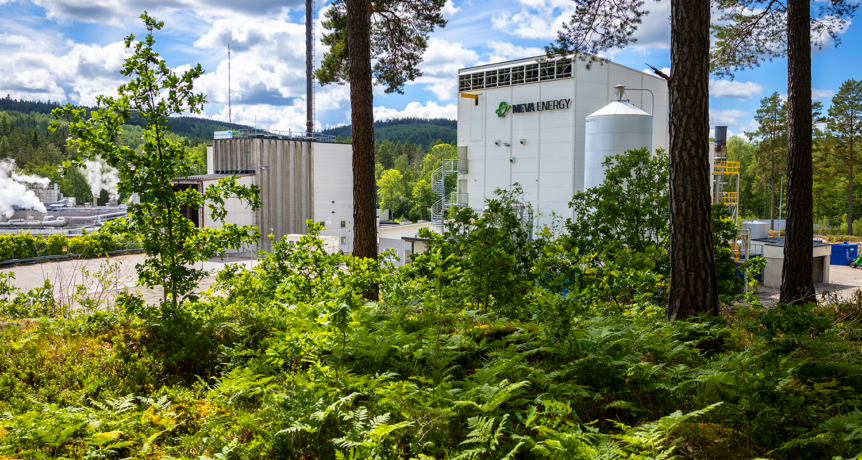Meva Energy today announces the results of its first life cycle assessment (LCA)[1] conducted in collaboration with Chalmers University of Technology. The study reveals that the company’s biomass gasification plant in Kisa not only reduces emissions but has the potential to achieve negative emissions, as low as -6 g CO2-eq/kWh.
The manufacturing industry today accounts for large emissions of greenhouse gases and is heavily dependent on fossil energy resources. Meva Energy’s gasification technology offers a unique opportunity for manufacturing industries not only to reduce their greenhouse gas emissions but to achieve negative emissions, if the application of the biochar constitutes as a permanent carbon removal. This means more carbon dioxide is removed from the atmosphere than is emitted.
The LCA study, conducted in 2024 in collaboration with Chalmers University of Technology is based on the ISO 14040/14044 standards[2] and verifies that including the carbon capture effects of biochar, Meva Energy’s gasification plant in Kisa results in -6 g CO2-eq/kWh. This value includes the impact of the entire system (from cradle to grave) and also includes the climate impact from building, construction and end of life management. Despite this expansion, the result is still a negative emission value.
”Through our biomass gasification technology, we can transform locally sourced biogenic waste into two valuable products: biogas and biochar,” explained Niclas Davidsson, CEO of Meva Energy. ”Biogas serves as a renewable energy source for industrial processes, replacing fossil fuels, while biochar, recognized by the EU as a carbon dioxide removal (CDR) technology, enhances soil health and reduces atmospheric carbon. Combining these benefits is the reason we achieve such good metrics in our LCA.
”With our vision of a fossil-free manufacturing industry, an awareness of the environmental performance of our technology and our products is of utmost importance. The company has long understood the role of its technology in mitigating climate change, but this LCA study strengthens our position and the role of biomass gasification,” says Sara Palander, Sustainability Manager Meva Energy.
The complete study, ”Life Cycle Assessment of Biosyngas from a Multifunctional Biomass Gasification Plant in Sweden,” by Heloise Hedbom and Petter Lundh, is available through the Department of Technology Management and Economics at Chalmers University of Technology.
Read more about the findings here.
About Meva Energy
Meva Energy is an innovative company that provides renewable energy solutions to its customers in the manufacturing industry. Meva Energy’s technology focus is thermo-chemical conversion of solid biomass residue. The proprietary and award-winning technology is able to convert solid residue to renewable gas and it is the world’s only conversion technology having full acceptance of fine fraction feedstocks such as saw dust or fiber residue. Due to the stability and simplicity of the conversion process, the Meva Energy system is able to produce renewable gas cost-competitive to fossil gas. Meva Energy is backed by the climate fund Just Climate, AXA Investment Managers, Innoenergy and has received financial grants from the Swedish Energy Agency and Swedish Environmental Protection Agency. Learn more at https://mevaenergy.com
Press contact: Meva Energy: Elsa Kayser, Marketing and Communications Officer, +46730987541, elsa.kayser@mevaenergy.com
[1] Life cycle assessment, LCA, is a family of methods used to analyse, assess and understand a product’s or a service’s environmental performance throughout the entire life cycle. From raw material extraction, to production, use, to its end of life management. The methods are globally accepted and used in various organisations to promote sustainability and to make informed decisions to reduce negative impact from products, services or activities.
[2] ISO 14040/14044 describes the requirements and guidance for life cycle assessments

